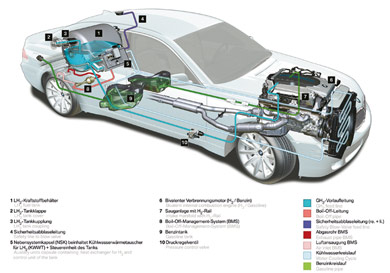Biohydrogen
Information on biohydrogen
The latest news and information on development of hydrogen technology in Europe is available from the Fuel Cells and Hydrogen Joint Undertaking (FCH JU) a unique public private partnership supporting research, technological development and demonstration (RTD) activities in fuel cell and hydrogen energy technologies in Europe. Its aim is to accelerate the market introduction of these technologies.
Also see the BioHydrogen Platform which offers a dedicated environment for sharing information on biological production of hydrogen from biomass and communication on hydrogen topics. It provides access to various (inter)national Biohydrogen projects and the activities of The International Association of Hydrogen Energy and The Netherlands Biohydrogen Network.
The European Hydrogen and Fuel Cell Association also maintains a database of relevant EU Projects.
Production of biohydrogen
Hydrogen for use as a transport fuel can be produced from fossil fuels as well as renewable sources (biohydrogen).
Steam reforming
Biohydrogen may produced by steam reforming of methane (biogas) produced by anaerobic digestion of organic waste. In the latter process, natural gas and steam react to produce hydrogen and carbon dioxide.
Fermentation
Biohydrogen may also be produced by fermentation. Fermentation of renewable materials by bacteria may take place in light (photofermentation) or in the absense of light (dark fermentation). Research is focused on increasing yields of biohydrogen from various strains of bacteria.
Microbial Fuel Cells
In the US, researchers at Penn State University in the US, have developed a microbial electrolysis cell to produce hydrogen from renewable resources. The method uses bacteria called "exoelectrogens" to break down acetic acid - produced by fermenting cellulose, glucose or other organic matter. See: Abstracts from Microbial Fuel Cells: First International Symposium. The Pennsylvania State University, University Park, PA. May 27-29, 2008.
Production of biohydrogen by algae
Algae (e.g. Chlamydomonas reinhardtii) also produce hydrogen under anaerobic conditions, and novel techniques are also being developed to increase yields via this route.
EU-funded projects on biohydrogen
Previous EC Projects relevant to Hydrogen
The FP7 project PLANT POWER - living plants in microbial fuel cells for clean, renewable, sustainable, efficient, in situ bioenergy production, investigated microbial fuel cells, which might be used as future large-scale Europe wide green energy providers. Such a system can produce in situ 24 hours per day green electricity or biohydrogen without harvesting the plants.
HYVOLUTION Non-thermal production of pure hydrogen from biomass (FP6 - 19825)
CHRISGAS - Clean Hydrogen-rich Synthesis Gas (FP6 - 502587)
Biomass and Waste Conversion in Supercritical Water for the Production of Renewable Hydrogen (FP5 – ENK6 - 00555)
BIOHYDROGEN: A novel bioprocess for hydrogen production from biomass for fuel (FP5 - QLK5 - 01267)
SYSAF - The EC Joint Research Centre action on Systems for Alternative Fuels also covers use of hydrogen in transport
HySYS - Research on low-cost components for fuel cell (FC-) systems and electric drive systems which can be used in future hybridised FC-vehicles (medium term objective) and ICE vehicles.
HyTRAN - Hydrogen and Furel Cell Technologies for Road Transport
HyLights
StorHy - Hydrogen Storage Systems for Automative Applications
US Research on hydrogen from sustainable resources
In the US, researchers at NREL Researchers at NREL are developing advanced processes to produce hydrogen economically from sustainable resources. These R&D efforts include :
- Biological Water Splitting
- Photoelectrochemical Water Splitting
- Conversion of Biomass and Wastes
- Solar Thermal Water Splitting
- Renewable Electrolysis
See also the Hydrogen from Coal Plan (2.8Mb PDF covering the concept of coal-biomass hydrogen production).
Use of biohydrogen
Hydrogen market development
Currently most hydrogen is produced from fossil fuels (e.g. steam reforming of natural gas). Prototype hydrogen vehicles have been developed, but there is currently no significant infrastructure for distributing hydrogen as a transport fuel, and in-vehicle storage capacity is still an issue. In addition, hydrogen fuel cells are expensive to produce and fragile, and have a relatively short service life. Extensive research is being carried out on chemical storage of hydrogen.
Hydrogen powered cars

© Copyright Honda
Honda plans to deliver about 200 FCX Clarity hydrogen-powered fuel cell vehicles to customers in the first three years of its fuel cell lease program.
Use of hydrogen in combustion engines
BMW has developed liquid-hydrogen combustion engines and released a limited run of 100 bivalent (gasoline/hydrogen) BMW Hydrogen 7 cars to demonstrate technical feasibility. There are no immediate plans for larger-scale production.

© Copyright BMW
BMW Hydrogen 7 View larger image

© Copyright BMW
BMW Hydrogen 7 View larger image
